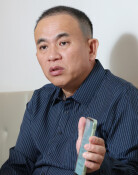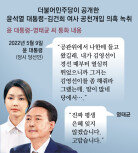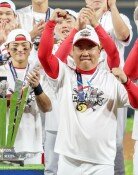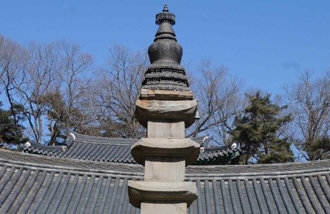Constitutional amendment
President Lee Myung-bak told a meeting of the ruling party, administration and presidential office Sunday, When discussing constitutional amendment, we must think from the viewpoint of our national plan for the next 100 years. He said this while proposing discussion of constitutional provisions on power structure, climate change, women, inter-Korean relations and the judiciary system from a broad perspective to meet the needs of the 21st century. This is the second time he commented on constitutional amendment after his Liberation Day speech in August last year. The issue should be discussed at the National Assembly level, not the administration or the presidential office, and discussions should end by years end, he said. Hence, the ruling Grand National Party will likely hold a heated debate on the matter at a general meeting of its lawmakers Feb. 8-10.
The procedures and frequency of constitutional amendment differs by country. Japans Peace Constitution, which was declared in November 1946 after World War II, bans Japan from possessing combat capability and engaging in warfare but has never been amended. In contrast, Frances Fifth Public Constitution has been amended 24 times since its adoption in 1958.
Several points President Lee made on the need for a constitutional amendment are agreeable. The Constitution, which was last amended in 1987 under an agreement between then President Roh Tae-woo and political heavyweights Kim Young-sam, Kim Dae-jung and Kim Jong-pil, contains the peoples desire for democracy but has lagged behind societal changes some 24 years later. Debate has ceaselessly raged over loss of national energy and costs resulting from the single five-year presidential term and the presidential and general elections being held in different years. When President Roh Moo-hyun proposed a one-point constitutional amendment on a presidency of two four-year terms in 2007, representatives from the countrys six major political parties agreed to conclude the constitutional amendment discussion at the 18th General Assembly (2008-12). Since the amendment was not realized, however, it is unclear whether a multi-point constitutional amendment as proposed by President Lee is possible at a time when his term is nearly over.
The Korean Constitution is rigid and the procedures for constitutional amendment are complicated. So meeting all of the conditions for amendment even if rival parties agree is tough. A member of the ruling Grand National Partys main faction said, Since a behind-the-scenes debate has made considerable process, it wont take long. Whether such a debate has been conducted with public consensus is questionable, however. According to a New Years survey by The Dong-A Ilbo, respondents named inter-Korean relations (30.2 percent), economic growth (25.7 percent), and resolution of economic disparity (14.9 percent) as the biggest priorities for President Lee in his fourth year in office. Constitutional amendment was not considered a top priority.
Past presidents have proposed discussion on constitutional amendment later rather than early in their terms, so they failed to win momentum to push ahead with amendment and were questioned over the sincerity of their intent. In an apparent bid to divide the ruling camp, the main opposition Democratic Party said, "President Lees suggestion of a constitutional amendment is meant to keep former Grand National Party chief Park Geun-hye in check." The president needs to use extra caution in his approach when debating constitutional amendment in the latter part of his term.
Headline News
- N. Korea conducts ICBM test ahead of U.S. presidential election
- Samsung Electronics to expand 5th Gen HBM Sales in Q4
- Gov’t flags possible tax evasion among pension exemption applicants
- Draft of U.S.-brokered 60-day truce between Israel and Hezbollah leaked
- Half of working seniors earn less than 1 million won per month







